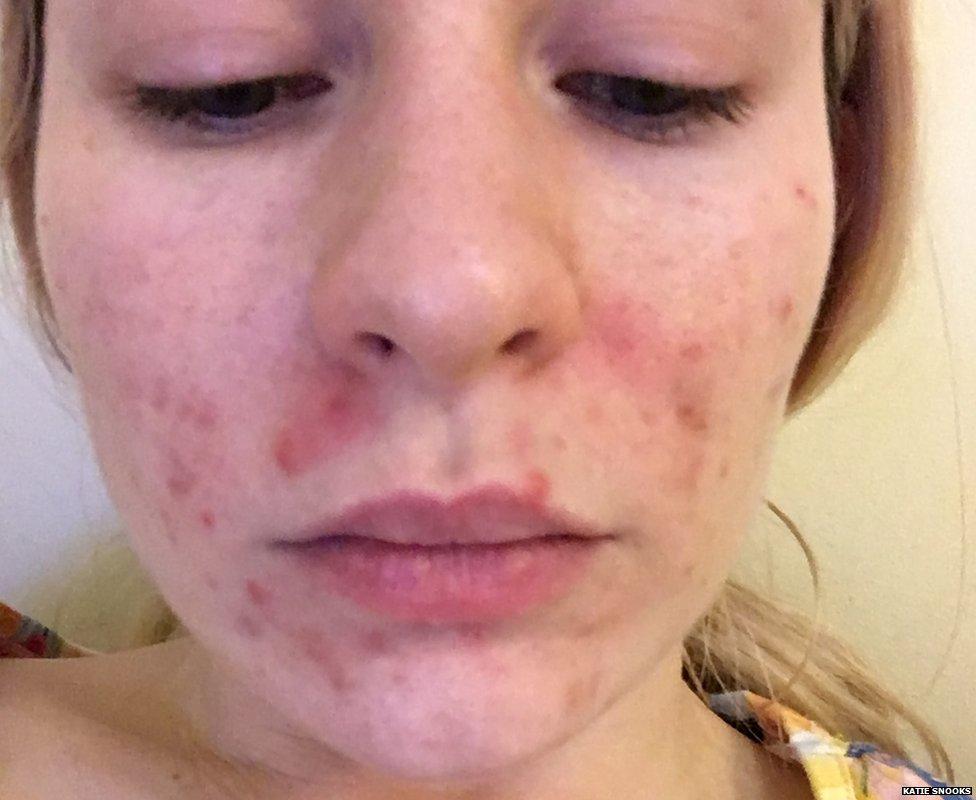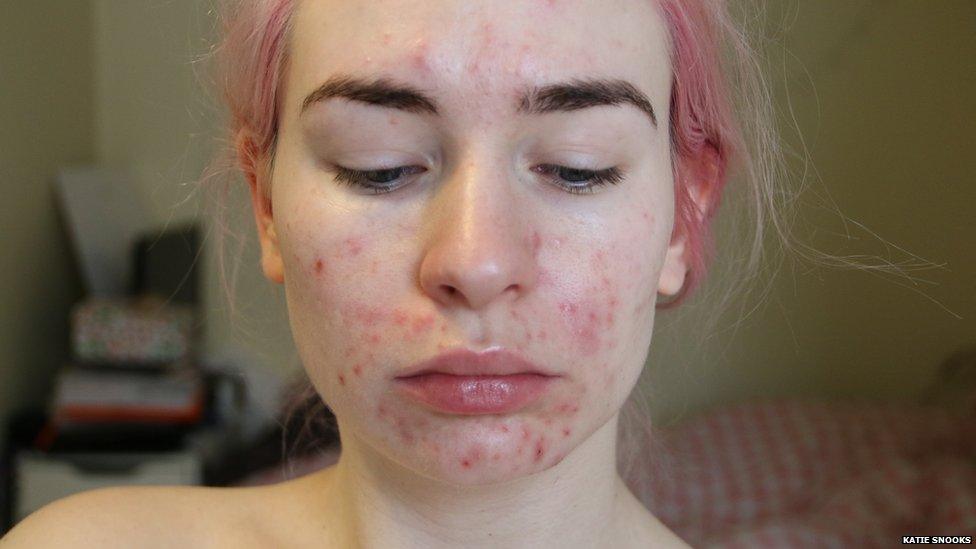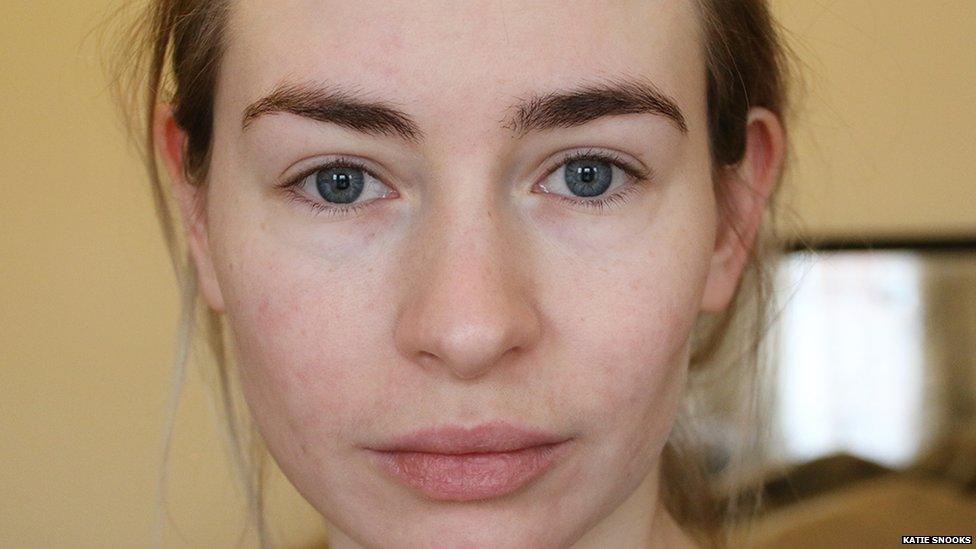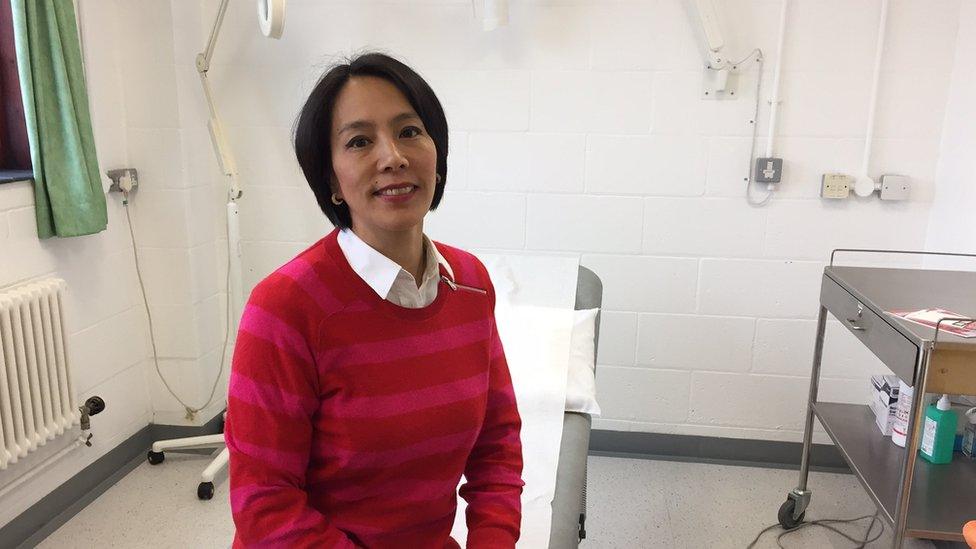Lack of skin specialists causes delays for acne patients, says dermatologist
- Published
A lack of trained skin specialists is having a huge impact on acne patients, says a leading dermatologist.
Dr Tamara Griffiths says of 800 positions, more than 200 are unfilled and it's been getting worse over the past decade.
She says it's causing long waits for people trying to get treatment.
Newsbeat has also been told that financial pressures on the NHS are making it harder for those with acne to be seen by a dermatologist.
"It is extremely frustrating that we can't serve our patient population as well as we would like," says Dr Griffiths.
BBC Advice has help and information if you are affected by acne.

This is what Katie's acne looked like the day before she started taking Roaccutane
Speaking on behalf of the British Association of Dermatologists, she says the lack of skin specialists is part of a bigger problem.
"If you look at the wider workforce crisis in the NHS, there are more unfilled GP posts and more unfilled acute medicine posts.
"Dermatology doesn't live within a bubble because we're connected to the rest of medicine and these are huge issues."
Dermatologists are trained to be able to prescribe stronger treatments such as Roaccutane, as well as detect signs of the psychological impact of acne.
"The real issue with skin disease, acne included, is that it may not be life-threatening but it certainly can be life-ruining," she explains.

This photograph was taken 19 days after Katie started her Roaccutane treatment
Katie Snooks, 28, says she has suffered with acne for 10 years and it dominated her life.
She's a YouTuber and has made many videos about dealing with the condition.
"I tried five different antibiotics, I even tried light therapy but none of them worked," she explains.
For her, effective treatment only came when she was prescribed Roaccutane.
"The success rate is high but it's also hard to get because you can't get it from a GP and it took me a couple of years to get referred to a dermatologist," says Katie.
Because the drug is powerful it also carries risks, with possible serious side effects, external including nose bleeds, headaches and anxiety.
Women who are pregnant or breastfeeding are advised not to take it.
It can only be prescribed by a specialist.

This photograph was taken in Katie's last month of treatment
Official figures reveal the number of patients with acne being sent to see a dermatologist in England has more than doubled over the past five years.
It has gone from 2,436 cases in 2010-11, to 6,383 in 2015-16.
Similar data isn't available for Northern Ireland, Scotland or Wales.
Dermatology outpatient cases have risen in Wales over a similar time frame, with 181,156 in 2015-16, up from 169,815 in 2011-12.

Dr Griffiths says that "public awareness" and a desire for skin "perfection" are some of the reasons as to why England's dermatologists have seen this increase.
"More people are aware of skin disease and it's something everyone can see on themselves," she says.
Jessica Taylor has had acne since she was 12 and she's now 22.
"It's worse on my shoulders and it does go down my back as well," she says.

Jessica and Brendan have both taken part in Newsbeat's latest BBC iPlayer documentary, Me My Spots and I
"It means I have to be careful about what tops I wear because I don't want to reveal it too much."
Acne symptoms range in severity from person to person.
"If your acne is relatively mild, or it's not affecting you psychologically that much, you could see the pharmacist, try some of the over-the-counter treatments," says Dr Griffiths.
She acknowledges there could be a "long wait" for someone with more severe symptoms, who wants to see a specialist.
"My message to the individual acne patient is stand up for yourself and get yourself treated," she says.
What the devolved UK health regions say

Health Education England
"We are aware that employers report current shortages in this specialty. The dermatology consultant workforce is growing steadily as a result of investment decisions made prior to the creation of Health Education England."
Scottish Government
"We recognise that acne can be a distressing condition for many young people. There is a range of support and treatments available on the Scottish NHS."
Welsh Government
"We are working with the NHS to improve dermatology services in Wales, to ensure that all young people who need it can access high-quality dermatology services when they need them."
Northern Ireland Health and Social Care Board
"The majority of positions for consultant dermatologists in Northern Ireland are currently filled and we continue to provide the full range of dermatology services to patients across Northern Ireland."
Find us on Instagram at BBCNewsbeat, external and follow us on Snapchat, search for bbc_newsbeat, external